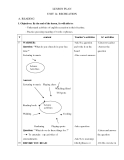


Unit 14: RECREATION
Look at the people in
these pictures.
A. READING
What are they
doing?
WARM-UP:
WARM-UP:
When do they often
do these
activities?
What do you often
do in your free
time?

Work in pairs. Which of the following leisure
activities do you think British people do in
their spare time?
reading books/newspapers
watching TV/videos
playing sports
shopping
singing
meeting friends
listening to music
watching sports
spending time outdoors
playing a musical instrument

•Leisure (n):
•Ex: In her leisure time, she visits museums and galleries.
•Recreation (n):
•Household (n):
•Average( n):
•Ex: The average of 3, 8 and 10 is 7.
•Pursuit (n): Pursue (v):
Ex: My pursuits include listening to music, reading, and gardening.
Undertake (v) :(undertook – undertaken)
•Sophisticated (a):
•Ex: a play that will only appeal to sophisticated audience.
•Entry qualification (n.p): entry procedures
NEW
WORDS
AND
PHRASES

READ THE TEXT AND LISTEN TO THE TAPE: UNIT 14:
RECREATION
“All work and no play makes Jack a dull boy”, goes an English saying. Recreation
and entertainment are important to people everywhere in the world. However, forms of
popular entertainment are different in different countries.
In Britain, the most common leisure activities are home based. Watching television
is by far the most popular pastime, and nearly all households have a television set.
Over 51 percent of households have two or more television sets and average viewing
time for the population aged four and over is 25 hours a week. Other pursuits include
listening to music, reading, do-it-yourself home improvements, and gardening.
British people are also very interested in watching and taking part in sports. Walking
and swimming are the two most popular sporting activities, being almost equally
undertaken be men and women. Snookers, pool and darts are the next most popular
sports among men. The most popular spectator sports are football and rugby in winter,
and cricket and athletics in summer.
In the last few years in Britain, a new trend has been developing, i.e., taking
weekend or holiday courses. There is a enormous range of courses on offer. The
course can be as simple as bricklaying or as sophisticated as making your own stock
market decisions. For people who are interested in art, there are courses in painting or
drawing. People who like music can take a course in karaoke singing. Courses like
shoemaking or glass engraving provide people with practical skills they can do with
hands. Those who want to improve their minds can take a course of “Living with more
meaning”. Entry qualifications to weekend courses are generous, that is, generally no
qualifications are necessary, apart from an ability to pay the fees, which may be quite
high.


























